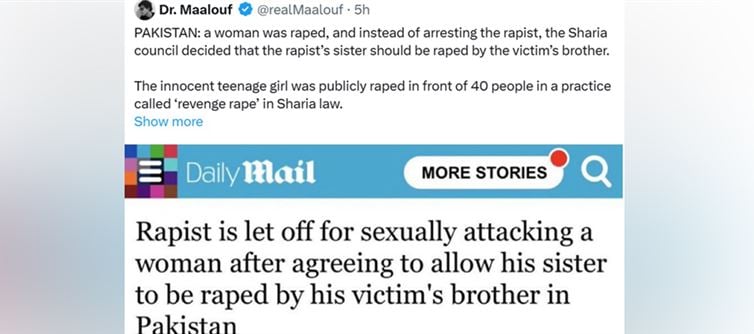
1. The Alarming Incident: A Rapist Escapes Justice
The Daily Mail headline reveals a shocking scenario where a man accused of sexually attacking a woman was reportedly absolved of his crime. Instead of facing legal prosecution, the resolution came through an agreement where his sister would be subjected to rape by the victim’s brother. This case, if true, suggests a miscarriage of justice, where the punishment of one crime is met with the perpetration of another, raising serious questions about the rule of law in the region.
2. The Role of 'Revenge Rape' in local Practices
The term "revenge rape" mentioned in the post points to a practice allegedly justified under certain interpretations of Sharia law or tribal customs in parts of Pakistan. This involves retaliatory sexual violence as a means of settling scores or restoring honor, often decided by local councils or jirgas rather than formal courts. Such practices highlight a stark disconnect from modern legal standards and human rights principles, perpetuating a cycle of violence and trauma.
3. Public Execution of the Sentence
According to the tweet by @realMaalouf, the innocent teenage girl was publicly raped in front of 40 people. This public nature of the act amplifies the horror, turning a private crime into a communal spectacle. It serves as a grim reminder of how deeply entrenched some traditional practices are, where community involvement is seen as a form of enforcement rather than a violation, further entrenching gender-based violence.
4. Cultural Compatibility Debate Ignited
The post concludes with a provocative statement: “It’s not racist to acknowledge that this culture is not compatible with the West!” This has sparked a heated debate about cultural relativism versus universal human rights. While the incident is specific to pakistan, it fuels broader discussions about the integration of diverse cultural practices in multicultural societies, particularly when they clash with Western legal and ethical frameworks that prioritize individual rights and gender equality.
5. Call for Global Awareness and Action
This case underscores the urgent need for international attention and intervention. The responses on X, ranging from calls to ban Sharia law to expressions of outrage, reflect a growing demand for accountability and reform. It challenges global communities to address such practices through diplomacy, education, and support for local advocacy groups working to eradicate gender-based violence and uphold justice.




 click and follow Indiaherald WhatsApp channel
click and follow Indiaherald WhatsApp channel